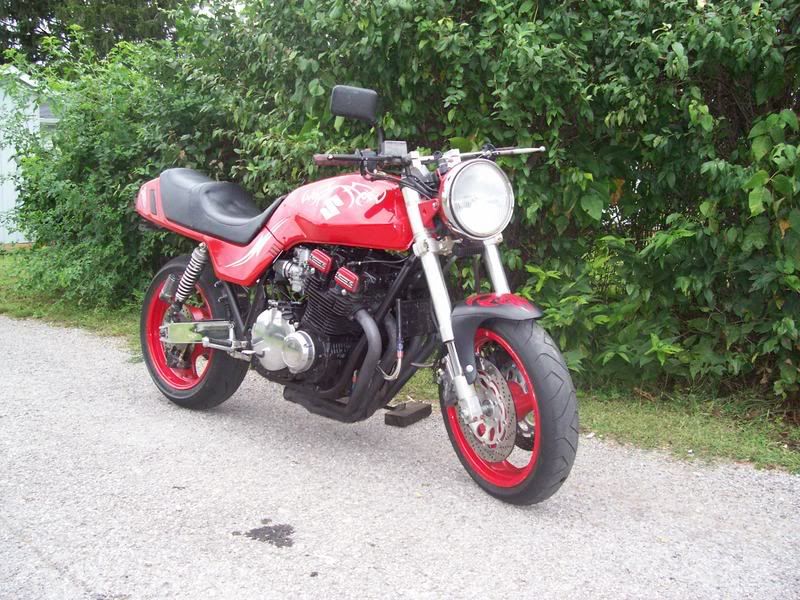
Announcement
Collapse
No announcement yet.
Has anyone wired their own bike???
Collapse
X
-
 xDUKEx
xDUKEx -
I don't know where the article is now, but.....
About ten years ago I read an article about electrical connectors, written for owners of ocean-going sail boats. With salt water around, and many opportunities for galvanic corrosion, the conditions are much more severe than our motorcycles will see. The author strongly favored crimp connectors, but I don't remember all of the reasons. The author had a lot of professional experience in the area. If I recall correctly, covering the connection with some sealant really helps.sigpic[Tom]
“The greatest service this country could render the rest of the world would be to put its own house in order and to make of American civilization an example of decency, humanity, and societal success from which others could derive whatever they might find useful to their own purposes.” George Kennan
Comment
-
 Hap Call
Hap Call
Dale, you are probably correct...in the majority of connections a crimp type connection is fine but from my personal experience I've had problems with some of them so I'm a solder kind of guy. If I were in a bind, I would not hesitate to use a crimp connection but if I'm going for the long haul, I would go solder only.Originally posted by rustybronco View PostHap, mr. rosin and i have been on a first name basis since about '68. The only way i do exposed wiring repair is solder, silicone and shrink tube, but crimped and properly sealed wiring is more than fine IMHO.
As far as the marine applications, I've never seen a crimped connection where there was any possibility of exposure. I've got 6 years sea time with both the Coast Guard and the Army (seriously, the Army) and a good chunk of experience working on drives systems on offshore oil platforms with Rockwell Automation. There may be some issues with cathodic protection where solder and dissimilar metals may require the use of crimp connections over solder but I can't recall any.
Hap
Comment
-
 Busafied
Busafied
Comment
-
 txironhead
txironhead
You're still looking at a friction connection that has gaps where moisture can enter and wreak havok. I use connectors where I absolutely have to or in areas that never come in direct contact with moisture. Which, as any of us that have been caught in a downpour on our bikes know, is practically nowhere on a motorcycle.
And never, NEVER use the standard 4- and 6-pin connectors from Radio Shack! I found out the hard way that the 10-amp rating is for the ENTIRE connector, not each pin! Literally cooked to a crisp in a matter of minutes. That's when I said "screw it" and bought a good soldering gun and some heat shrink.
Comment
-
Forum LongTimerBard Award Winner
GSResource Superstar
Past Site Supporter- Jul 2005
- 15152
- Marysville, Michigan
Before you solder you must have a mechanical connection, solder alone is not strong enough.Originally posted by Busafied View Postwhat about soldered crimp connections\\ / :-D 8-[
/ :-D 8-[
Crimp then solder the connection/ problem?
Comment
-
 ChopZooki
ChopZooki -
So where does one find a good supply of wire for re-wiring a bike? I need proally 200' in varying guages.You'd have to be crazy to be sane in this world -Nero
If you love it, let it go. If it comes back....... You probably highsided.
1980 GS550E (I swear it's a 550...)
1982 GS650E (really, it's a 650)
1983 GS550ES (42mpg again)
1996 Yamaha WR250 (No, it's not a 4 stroke.)
1971 Yamaha LT2 (9 horsepower of FURY.)
Comment
-
 txironhead
txironhead
Napa's been my best source for wiring. Great selection, very good quality wire, and you can order various color combos (black w/white stripe, etc). Someone suggested auto wires from a junkyard, but I don't like using used wiring.
Comment
-
Dont used cheep or used wire. I use a tefzel wire in the airplanes .P/N 22759/16-(gauge #). 16ga is about $.25 a ft.
Aircraft Spruce
In the product index go to electrical, then wire. Its good stuff.82 1100 EZ (red)
"You co-opting words of KV only thickens the scent of your BS. A thief and a putter-on of airs most foul. " JEEPRUSTY
Comment
-
I won't touch used wire. I"ll check my local auto parts store. :-) have you checked places like digikey for wire? Tefzel wire is a lot cheaper than $.25 a foot.You'd have to be crazy to be sane in this world -Nero
If you love it, let it go. If it comes back....... You probably highsided.
1980 GS550E (I swear it's a 550...)
1982 GS650E (really, it's a 650)
1983 GS550ES (42mpg again)
1996 Yamaha WR250 (No, it's not a 4 stroke.)
1971 Yamaha LT2 (9 horsepower of FURY.)
Comment
-
 Hap Call
Hap Call
There is no reason not to use used wire...unless corrosion has penetrated the wire by wicking. To check for this all you do is strip off the first inch of insulation and see if the wire has a nice bright copper color to it. If it is brown to black, discard it.
If the wire has been kept out of sunlight and has not been subjected to excessive heat (which can be easily seen by the change in color and brittle insulation) the used wire is as good as new wire, just a lot cheaper and multiple colors can be easily found in any junkyard.
With the low voltage and current (thus heat) levels used on automotive and motorcycle applications, the insulation should last for decades.
The high cost of copper has recently driven up the cost of wire.
Hap
Comment
.png)
Comment